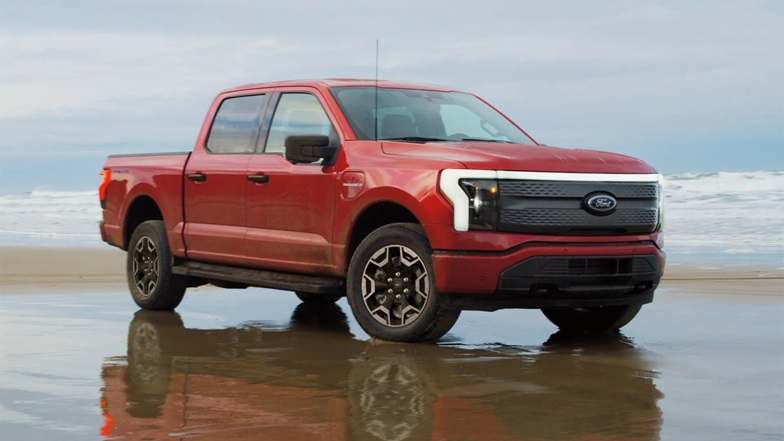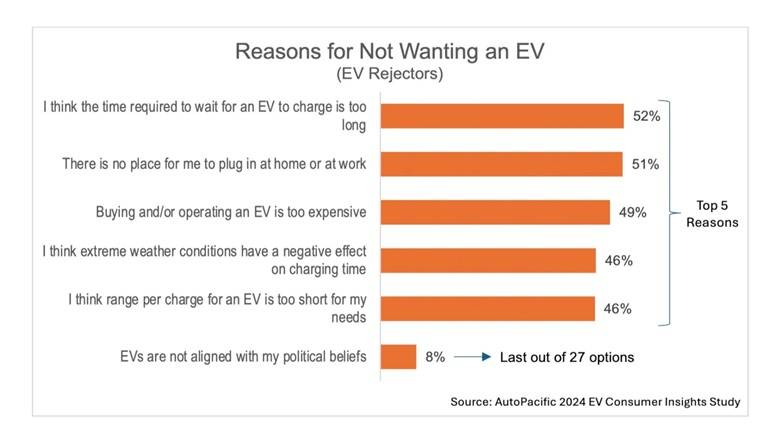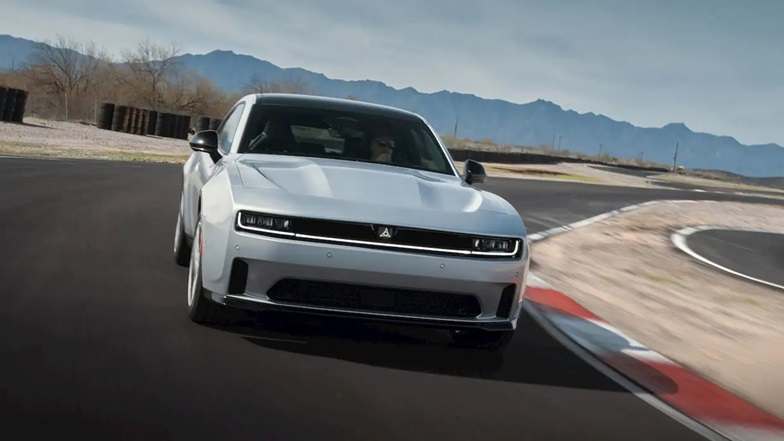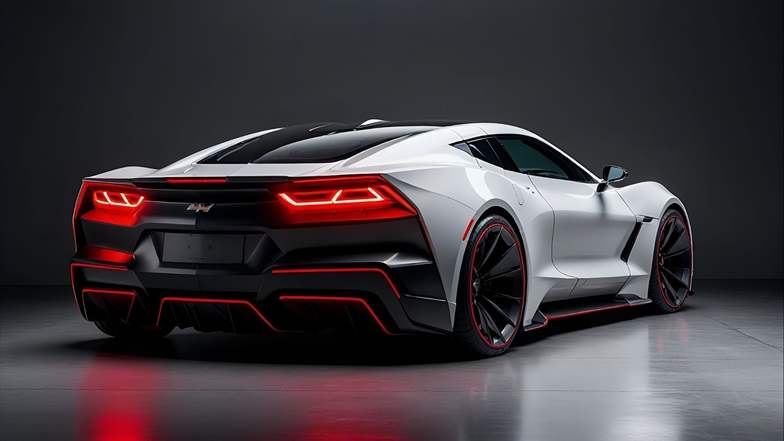As the 2024 U.S. presidential election heats up, it’s easy to think that electric vehicle (EV) interest might be tangled in political beliefs. However, a new study by AutoPacific suggests that, while EV ownership has political leanings, rejection of EVs isn’t as politically driven as one might assume. In this blog post, we’ll break down key insights from AutoPacific’s findings on EV attitudes across the political spectrum and what it means for the future of EV adoption.

EV Ownership Has Political Leanings – But It’s Not Everything
AutoPacific’s EV Consumer Insights Study, conducted in June 2024, surveyed 12,000 Americans. The study included a wide range of participants: current EV and plug-in hybrid owners, people interested in purchasing an EV, and those who outright reject the idea of owning one. The results confirmed a familiar trend—current EV owners tend to lean left politically. About 54% of current EV owners and 60% of plug-in hybrid owners identified as Democrats, whereas 30% of EV owners and 26% of plug-in hybrid owners identified as Republicans.
Interestingly, when it comes to future EV adopters—those who are open to considering an EV purchase—the political gap starts to shrink. Among these “acceptors,” 46% identified as Democrats, 28% as Republicans, and 24% as Independents or third-party members. This suggests that the idea of switching to an EV is becoming more bipartisan as more people show interest in EVs, regardless of their political affiliation.
Political Reasons Ranked Low for Rejecting EVs
Despite some stereotypes that associate EVs with certain political beliefs, the study found that very few people reject EVs solely for political reasons. Only 8% of respondents said they would avoid an EV because they don’t align with their political beliefs, a slight drop from 10% the previous year. Of those who cited political reasons, 62% identified as Republicans, while only 13% were Democrats.
In fact, political beliefs ranked dead last among 27 reasons for not considering an EV. The top reasons for EV rejection were much more practical: 52% of respondents worried about long charging times, 51% said they lacked access to charging at home or work, and 49% were concerned about the upfront and operational costs of EVs.
Top Reasons for EV Hesitancy
| Top Reasons for Not Considering an EV | Percentage of Respondents |
|---|---|
| Charging times are too long | 52% |
| No access to charging at home or work | 51% |
| Too expensive to buy and/or operate | 49% |
| Political beliefs don’t align | 8% |
This comparison shows that practical concerns around cost, charging infrastructure, and time efficiency dominate, far outweighing political reasons in people’s EV hesitancy.
Why This Matters for Automakers
These findings likely come as a relief for automakers who have been concerned about EVs becoming a political battleground. Earlier this year, General Motors CEO Mary Barra expressed surprise over the politicization of EVs, while Rivian CEO RJ Scaringe voiced disappointment at the narrative surrounding EVs in the political sphere. Both Barra and Scaringe emphasized that EVs represent the future of transportation for practical reasons like environmental benefits, efficiency, and technological advancement.
This disconnect between political leaders and public sentiment is noteworthy, especially among Republicans. Despite some political figures pushing anti-EV rhetoric, many Republican voters are interested in EVs, recognizing benefits such as energy independence and technological innovation. For instance, former President Donald Trump has stated his intent to roll back EV policies if elected, yet some analysts argue that such a stance could be a political misstep.

Bipartisan Support for EVs Remains Strong
Despite the political divide, support for EV-friendly policies isn’t strictly split along party lines. A 2022 poll by an EV advocacy group revealed that both Democrats and Republicans supported pro-EV policies. This broad support points to a shared understanding of the benefits that EVs can bring, including energy independence and economic growth through American manufacturing.
This bipartisan support has left some Republicans questioning the shift away from EV-friendly stances, especially considering that top Republicans have found common ground with Tesla CEO Elon Musk, a prominent figure in the EV world. The narrative that EVs are politically divisive may not truly reflect the perspective of the public or even all politicians.
The Road Ahead: Moving Beyond Politics in EV Adoption
In summary, while EV ownership may have a slight political lean, the rejection of EVs is not primarily driven by political beliefs. Instead, practical challenges like charging infrastructure, cost, and charging time are the main factors holding back EV adoption. This trend presents an opportunity for automakers and policymakers alike to focus on addressing these practical concerns, making EVs more accessible and appealing to a broader audience.
As the 2024 election approaches, it’s crucial for political leaders and industry experts to recognize that the future of EVs isn’t defined by political divides. Rather, it’s shaped by practical advancements that make EVs more convenient and affordable for everyday Americans. By working together to improve charging infrastructure, reduce costs, and increase public awareness, the U.S. can drive towards a more sustainable and energy-independent future without unnecessary political barriers.
Final Thoughts
The AutoPacific study provides a refreshing perspective: Americans’ views on EVs are driven more by practicality than by political affiliation. Addressing these real-world concerns will be key to fostering widespread EV adoption across all demographics, helping move the conversation about EVs from political debate to common ground.
PEOPLE WHO READ THIS, ALSO READ




